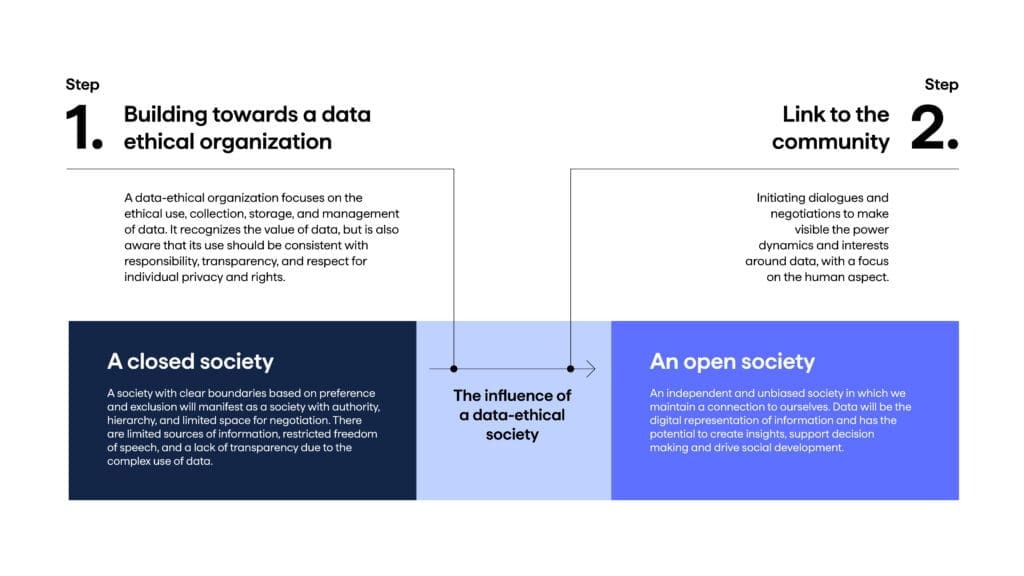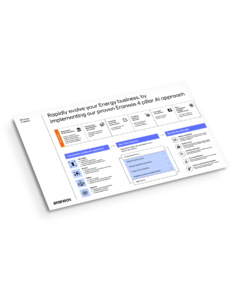When does facial recognition become spying? Does customer profiling lead to discrimination? Ethics and data are a complex combination due to different societal perspectives and values, such as privacy versus security. Organizations can only make responsible choices by developing a clear vision of what is good for the individual, the organization and society. In the second part of this diptych, we discuss how to manage data responsibly as an organization and contribute to an open society.
In the first part of this series, we discussed why data ethics is important. We saw that the question of what is ethical is not always easy to answer. Norms, values and individual perception determine what is and is not the right thing to do. So how do you as an organization ensure that you An organization that enables digital trust for its users must provide that trust in the form of data protection and security, and must provide transparency around the use of data-driven products and services.
Manage data transparently
The well-known paradox in digital trust is that most users believe that organizations provide elements of trust, while most organizations are unable to meet those expectations.
Organizations that fail to manage data ethics risk losing the trust of their users and destroy value. This does not automatically mean that organizations that put more effort into data ethics will therefore always see user trust increase. User trust is usually unpredictable and difficult to measure. Organizations that adhere to ethical standards demonstrate that they care about the interests and values of their users and are accountable for the data they use.
As a result, an organization’s investment in data ethics is well worth it. Organizations that invest in ethical use of data are able to:
- Increase user autonomy over their own data. The user can delete their own data if they wish and know where to turn for questions and complaints.
- Provide the user with more insight and transparency into what you as an organization are doing with his/her data.
- Promote responsible data use in the organization and thereby minimize risks and mitigate damage, for example in the event of data breaches or (un)conscious irresponsible data use, which can lead to financial consequences and reduced trust.
- Generate alignment of data ethics with organizational values. This strengthens the internal culture and can help attract new talent.
- Better comply with laws and regulations and avoid legal problems.
- This ensures that the organization also protects and respects user privacy.
- Send a strong signal to supervisors that data ethics is important to the organization and thus engage with society.
In addition to the benefits of investing in data ethics for an individual organization, this choice also has an impact on society. Data ethics builds user trust in digital systems and technologies, contributing to a healthy and thriving digital society. Thus, organizations that embrace the values of data ethics contribute to a safe and responsible digital world as part of an open society.
Open society in two steps
Data ethics ensures that the collection and use of data takes place within an ethical framework that that respect individual rights, promote inclusiveness, and build trust between users and between users and organizations. Through data ethics, users can freely share information, participate in society, and benefit from and benefit from technological advances without sacrificing their privacy and rights.
The figure shows the role of data ethics in an organization and its impact on an open society.
Building an ethical data program
Every organization, regardless of size, should have a responsible data use policy. Unfortunately, most organizations do not have clear rules about how to handle and protect user data. This is usually because organizations assume that most of the responsibility lies with supervisors. In other cases, there is no clear vision of what a data ethics program or ethics tools such as training, interview forms, and ethics committees should look like and how the mandate can be set up.
Good data ethics policies and enforcement put the user back at the center, with autonomy, transparency, and insight into their own data. By embracing data ethics, an organization can be a responsible steward of data. To create effective policies, organizations need appropriate governance and leadership to ensure standards are followed and evaluated.
Does your organization need help creating and implementing a data ethics program? Please contact us.
How can your organization contribute to an open society by properly managing data ethics? In this series on data ethics, we look at the moral pillars of an organization, its responsibilities and how organizations can build an ethical program. Keep an eye out for our whitepaper on this topic.





